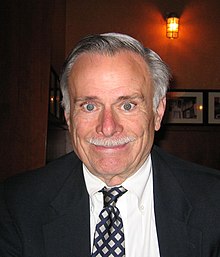John S. Waugh
John Stewart Waugh (born April 25, 1929 in Willimantic , Connecticut - † August 22, 2014 ) was an American chemist . He was a pioneer in nuclear magnetic resonance spectroscopy (NMR spectroscopy) and, together with others, made it possible to extend it from liquids to solids. He worked both theoretically and experimentally.
Life
Waugh studied at Dartmouth College (bachelor's degree in 1949) and at Caltech , where he received his doctorate in 1953 with Don M. Yost. Most recently, he was Professor Emeritus at the Massachusetts Institute of Technology . There he rose from 1953 to 1973 from instructor to professor ( AA Noyes Professor ). In 1958 he became a Sloan Research Fellow .
In 1976 he received the Irving Langmuir Award , in 1983/84 he received the Wolf Prize in Chemistry, in 1984 the Pauling Medal and in 2011 the Welch Award in Chemistry . He was a member of the National Academy of Sciences (appointed 1974) and the American Academy of Arts and Sciences (1961). In 1989 he received a Sc. D. (English honorary doctorate) from Dartmouth College . He was the author of the freely available software ANTIOPE for the simulation of NMR spectra and dynamics .
Alexander Pines was one of his doctoral students .
In 1972 he was a Humboldt Fellow at the Max Planck Institute for Medical Research and in 1953/64 as a Guggenheim Fellow at the University of Berkeley . In 1962 and 1975 he was a visiting scholar at the Soviet Academy of Sciences . In 1989 he was a Fairchild Scholar at Caltech .
He had been married since 1983 and had two children.
Individual evidence
Web links
| personal data | |
|---|---|
| SURNAME | Waugh, John S. |
| ALTERNATIVE NAMES | Waugh, John Stewart |
| BRIEF DESCRIPTION | American chemist |
| DATE OF BIRTH | April 25, 1929 |
| PLACE OF BIRTH | Willimantic , Connecticut |
| DATE OF DEATH | 22nd August 2014 |
